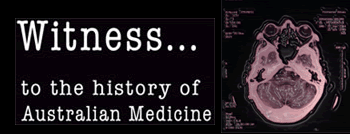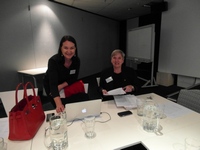


Tobacco Control: Australia's Role
Transcript of Witness Seminar
Introduction
Building the case for tobacco control
Producing, and Responding to, the Evidence
Campaigning for Tobacco Control
Economic Initiatives in Tobacco Control
The Radical Wing of Tobacco Control
Revolutionary Road
Tobacco Industry Strategies and Responses to Them
Campaign Evaluation
Managing Difficulties in Light of Community Consensus
Radical Wing Again
The Process of Political Change
Tobacco Campaigns Up Close
A Speedier Pace of Change
Political Needs and Campaign Strategies
Litigation and its Impacts
Insights from Tobacco Control
Tobacco Control in Australia in International Perspective
Appendix 1: Statement by Anne Jones
Endnotes
Index
Search
Help
Contact us

Rohan Greenland: A very wily minister.
The MTAG approach is really the rolled gold example of good practice and I don’t think we’ve seen something like that for a long time because of the alignment of state and territory NGOs supporting the national initiative.
Ron Borland: One of the interesting things about the way MTAG worked closely with the Minister was shown when David (Hill) came into my office. He said the Minister was worried that the ads might be having an adverse effect on kids because someone presumably from the tobacco industry had said, ‘If you put these gross ads out it’s going to encourage kids to smoke’.
So he (David Hill) said, ‘We’ve got to get some data.’ So we found a couple of schools and rushed out and showed them the rough cuts of the ad. It was all done within a week or so. We got these classes of kids to sit down and showed them the ad. And the rest was history.
They said, ‘Oohh that’s disgusting’. It was at that point that I realised these ads actually worked in a slightly different way. On the one hand, they disgusted the kids, but on the other they caused anxiety for smokers. They were incredibly powerful and being able to communicate that back was really important. So rapid research can make a difference!
Caroline Miller:[146] We did something similar with the parents’ campaign which is still being used. We had a concern that it would generate a lot of anxiety in kids about their parents’ ill-health. So we did some rapid research once again.
And the kids told us that they were already anxious about their parents dying as a result of smoking and they thought the ads were great because they would encourage them to quit.

L-R: Dr Caroline Miller and Dr Lyn Roberts, 29 May 2015. Image courtesy of Ann Westmore.
Andrew Herington: There’s an interesting interaction between trying to do those community interest campaigns as television ads and dealing with politicians who are often very twitchy. Someone can say, ‘It’s not this or it’s not that’, or ‘How will it play in marginal seats’ and everyone looks to doctors in terms of the immediate experts agreeing about what will happen.
Something that’s happened over last 10 years is that the great enthusiasm for TV marketing to change people’s views has been deadened by over-exposure and the public are becoming very negative about political advertising in particular, maybe less so in relation to health advertising.
It’s actually becoming a less effective vehicle for getting these kinds of messages across and people are looking increasingly to other modes and new technology and so forth to do that kind of behaviour change.
 |
Witness to the History of Australian Medicine |  |
© The University of Melbourne 2005-16
Published by eScholarship Research Centre, using the Web Academic Resource Publisher
http://witness.esrc.unimelb.edu.au/152.html